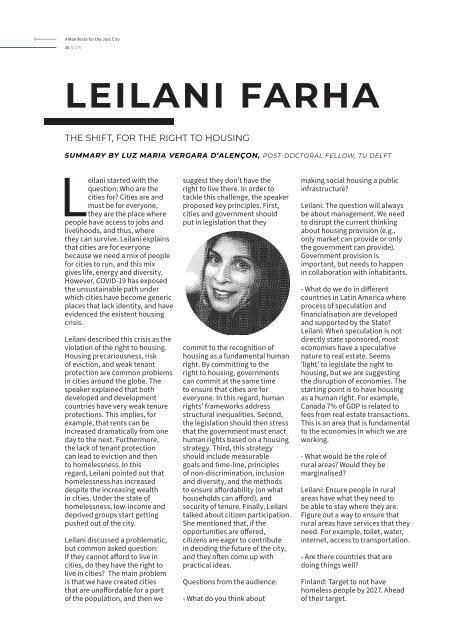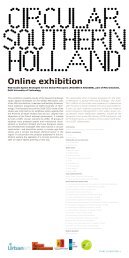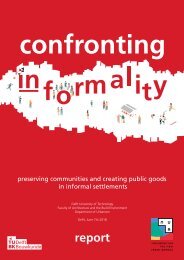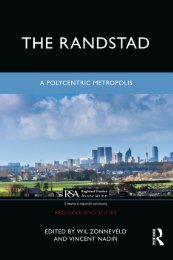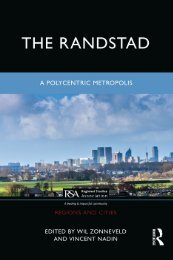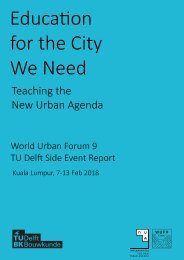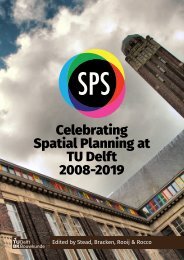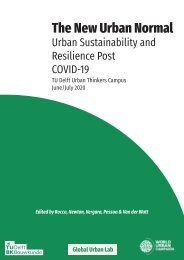A Manifesto for the Just City
On Monday 29 MARCH at 18:00 (CET/Amsterdam), TU Delft launched the Book "A Manifesto for the Just City", with texts by a number of guests and 43 manifestos written by students from 25 universities from all over the world. A “Manifesto for the Just City” comes in the wake of the realisation that socio-spatial justice is a crucial dimension for sustainability transitions. Growing inequality and the erosion of the public sphere undermine the social and political structures required to fight climate change, pandemics and other systemic shocks. With this book, we have sought to encourage students to formulate their own visions for the Just City and for a just transition. This book is result of an Urban Thinkers Campus organised between 9 and 30 November 2020. The Urban Thinkers Campus (UTC) model is an initiative of UN-Habitat’s World Urban Campaign, conceived in 2014 as an open space for critical exchange between stakeholders and partners. It aims to promote debate and action on sustainable and inclusive urbanization upholding the principles and guidelines contained in the New Urban Agenda, launched at Habitat-III in 2016 in Quito, Ecuador.
On Monday 29 MARCH at 18:00 (CET/Amsterdam), TU Delft launched the Book "A Manifesto for the Just City", with texts by a number of guests and 43 manifestos written by students from 25 universities from all over the world.
A “Manifesto for the Just City” comes in the wake of the realisation that socio-spatial justice is a crucial dimension for sustainability transitions. Growing inequality and the erosion of the public sphere undermine the social and political structures required to fight climate change, pandemics and other systemic shocks. With this book, we have sought to encourage students to formulate their own visions for the Just City and for a just transition.
This book is result of an Urban Thinkers Campus organised between 9 and 30 November 2020. The Urban Thinkers Campus (UTC) model is an initiative of UN-Habitat’s World Urban Campaign, conceived in 2014 as an open space for critical exchange between stakeholders and partners. It aims to promote debate and action on sustainable and inclusive urbanization upholding the principles and guidelines contained in the New Urban Agenda, launched at Habitat-III in 2016 in Quito, Ecuador.
Create successful ePaper yourself
Turn your PDF publications into a flip-book with our unique Google optimized e-Paper software.
A <strong>Manifesto</strong> <strong>for</strong> <strong>the</strong> <strong>Just</strong> <strong>City</strong><br />
38 // 276<br />
LEILANI FARHA<br />
THE SHIFT, FOR THE RIGHT TO HOUSING<br />
SUMMARY BY LUZ MARIA VERGARA D’ALENÇON, POST-DOCTORAL FELLOW, TU DELFT<br />
Leilani started with <strong>the</strong><br />
question: Who are <strong>the</strong><br />
cities <strong>for</strong>? Cities are and<br />
must be <strong>for</strong> everyone,<br />
<strong>the</strong>y are <strong>the</strong> place where<br />
people have access to jobs and<br />
livelihoods, and thus, where<br />
<strong>the</strong>y can survive. Leilani explains<br />
that cities are <strong>for</strong> everyone<br />
because we need a mix of people<br />
<strong>for</strong> cities to run, and this mix<br />
gives life, energy and diversity.<br />
However, COVID-19 has exposed<br />
<strong>the</strong> unsustainable path under<br />
which cities have become generic<br />
places that lack identity, and have<br />
evidenced <strong>the</strong> existent housing<br />
crisis.<br />
Leilani described this crisis as <strong>the</strong><br />
violation of <strong>the</strong> right to housing.<br />
Housing precariousness, risk<br />
of eviction, and weak tenant<br />
protection are common problems<br />
in cities around <strong>the</strong> globe. The<br />
speaker explained that both<br />
developed and development<br />
countries have very weak tenure<br />
protections. This implies, <strong>for</strong><br />
example, that rents can be<br />
increased dramatically from one<br />
day to <strong>the</strong> next. Fur<strong>the</strong>rmore,<br />
<strong>the</strong> lack of tenant protection<br />
can lead to eviction and <strong>the</strong>n<br />
to homelessness. In this<br />
regard, Leilani pointed out that<br />
homelessness has increased<br />
despite <strong>the</strong> increasing wealth<br />
in cities. Under <strong>the</strong> state of<br />
homelessness, low-income and<br />
deprived groups start getting<br />
pushed out of <strong>the</strong> city.<br />
Leilani discussed a problematic,<br />
but common asked question:<br />
If <strong>the</strong>y cannot af<strong>for</strong>d to live in<br />
cities, do <strong>the</strong>y have <strong>the</strong> right to<br />
live in cities? The main problem<br />
is that we have created cities<br />
that are unaf<strong>for</strong>dable <strong>for</strong> a part<br />
of <strong>the</strong> population, and <strong>the</strong>n we<br />
suggest <strong>the</strong>y don’t have <strong>the</strong><br />
right to live <strong>the</strong>re. In order to<br />
tackle this challenge, <strong>the</strong> speaker<br />
proposed key principles. First,<br />
cities and government should<br />
put in legislation that <strong>the</strong>y<br />
commit to <strong>the</strong> recognition of<br />
housing as a fundamental human<br />
right. By committing to <strong>the</strong><br />
right to housing, governments<br />
can commit at <strong>the</strong> same time<br />
to ensure that cities are <strong>for</strong><br />
everyone. In this regard, human<br />
rights’ frameworks address<br />
structural inequalities. Second,<br />
<strong>the</strong> legislation should <strong>the</strong>n stress<br />
that <strong>the</strong> government must enact<br />
human rights based on a housing<br />
strategy. Third, this strategy<br />
should include measurable<br />
goals and time-line, principles<br />
of non-discrimination, inclusion<br />
and diversity, and <strong>the</strong> methods<br />
to ensure af<strong>for</strong>dability (on what<br />
households can af<strong>for</strong>d), and<br />
security of tenure. Finally, Leilani<br />
talked about citizen participation.<br />
She mentioned that, if <strong>the</strong><br />
opportunities are offered,<br />
citizens are eager to contribute<br />
in deciding <strong>the</strong> future of <strong>the</strong> city,<br />
and <strong>the</strong>y often come up with<br />
practical ideas.<br />
Questions from <strong>the</strong> audience:<br />
- What do you think about<br />
making social housing a public<br />
infrastructure?<br />
Leilani: The question will always<br />
be about management. We need<br />
to disrupt <strong>the</strong> current thinking<br />
about housing provision (e.g.,<br />
only market can provide or only<br />
<strong>the</strong> government can provide).<br />
Government provision is<br />
important, but needs to happen<br />
in collaboration with inhabitants.<br />
- What do we do in different<br />
countries in Latin America where<br />
process of speculation and<br />
financialisation are developed<br />
and supported by <strong>the</strong> State?<br />
Leilani: When speculation is not<br />
directly state sponsored, most<br />
economies have a speculative<br />
nature to real estate. Seems<br />
‘light’ to legislate <strong>the</strong> right to<br />
housing, but we are suggesting<br />
<strong>the</strong> disruption of economies. The<br />
starting point is to have housing<br />
as a human right. For example,<br />
Canada 7% of GDP is related to<br />
fees from real estate transactions.<br />
This is an area that is fundamental<br />
to <strong>the</strong> economies in which we are<br />
working.<br />
- What would be <strong>the</strong> role of<br />
rural areas? Would <strong>the</strong>y be<br />
marginalised?<br />
Leilani: Ensure people in rural<br />
areas have what <strong>the</strong>y need to<br />
be able to stay where <strong>the</strong>y are.<br />
Figure out a way to ensure that<br />
rural areas have services that <strong>the</strong>y<br />
need. For example, toilet, water,<br />
internet, access to transportation.<br />
- Are <strong>the</strong>re countries that are<br />
doing things well?<br />
Finland: Target to not have<br />
homeless people by 2027. Ahead<br />
of <strong>the</strong>ir target.


